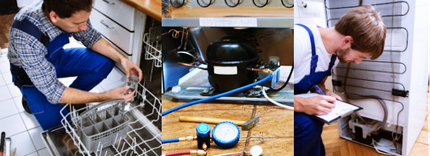Master Your Home Washer and Dryer Repairs – Washer dryer repair service Dependable Refrigeration
Master Your Home Washer and Dryer Repairs – Washer dryer repair service Dependable Refrigeration
Blog Article
A Comprehensive Look at DIY Home Appliance Fixing for Homeowners
If you've ever before faced a defective appliance, you understand exactly how discouraging it can be. Understanding usual issues and using the best troubleshooting techniques can conserve you time and cash. With the right tools and a little bit of expertise, you could tackle minor fixings on your own. When do you recognize it's time to call in an expert? Allow's check out the basics of DIY device repair work and what you need to keep your crowning achievement efficiently.
Understanding Common Appliance Concerns
When your appliances begin breaking down, it can feel overwhelming, especially if you're uncertain what the issue is. Common problems often develop with refrigerators, washers, and clothes dryers, and knowing what to seek can save you time and stress. If your fridge isn't cooling, check the temperature settings or pay attention for unusual sounds that may indicate a stopping working compressor.With washing equipments, leakages usually stem from used hoses or defective door seals. If your clothes dryer isn't heating, a blocked vent may be the culprit.
Essential Tools for DIY Repair Works
Having the right devices can make all the distinction in your DIY home appliance repair service initiatives. Start with a trusted toolset that includes screwdrivers-- both flathead and Phillips-- since many appliances make use of these kinds of screws. A tough pair of pliers is essential for clutching, twisting, or cutting cables. You'll likewise want an outlet set for getting rid of screws and nuts that hold devices together.A multimeter is vital for inspecting electric connections and diagnosing issues. Don't forget a level to guarantee your devices rest properly, as this can impact performance. Think about buying a torque wrench for certain tightening up needs. A good flashlight or job light will help you see into tight or dark rooms. With these tools in hand, you'll be well-equipped to deal with most DIY home appliance fixings with self-confidence.
Troubleshooting Techniques for Appliances
Prior to diving right into fixings, it is vital to identify the trouble impacting your device. Start by observing any type of unusual sounds, leaks, or error codes. Make note of when the issue takes place-- does it occur throughout specific cycles or under certain problems? This can supply clues.Next, speak with the customer guidebook for fixing ideas. Several appliances consist of a troubleshooting area that might address your issue straight. Online sources, forums, and video clips can also supply useful insights.If you can, perform easy tests: for a cleaning equipment, check if the door lock is engaging properly; for a refrigerator, see if it's preserving the right temperature.Lastly, don't neglect to inspect power resources-- guarantee your appliance is plugged in and that breaker are functioning. By methodically tightening down the issue, you'll be much better equipped to take on the repair efficiently.
Step-by-Step Repair Work Guides for Major Equipments
While you might really feel intimidated by the idea of repairing major home appliances, following a clear detailed overview can make the procedure manageable. Start by identifying the trouble-- this can be anything from a fridge not cooling down to a cleaning device not rotating. As soon as you've determined the concern, gather the necessary tools like screwdrivers, pliers, and a multimeter.Next, consult your appliance's guidebook for certain instructions and representations. This resource can be indispensable for understanding exactly how to take apart and rebuild your appliance safely. Begin the repair by unplugging the device and removing any panels or covers. Meticulously check elements, changing any kind of malfunctioning parts as needed.After you've finished the fixing, rebuild the device and test it to confirm whatever jobs correctly. Maintain a record of your repairs for future recommendation. With practice, you'll gain self-confidence in taking on much more complicated problems.
Safety Tips for Home Appliance Fixing
Before you begin any type of home appliance repair, see to it you're geared up with the best personal safety equipment like gloves and safety goggles. Always disconnect the appliance or switch off the power source to avoid any crashes. Remaining secure is equally as vital as completing the repair work itself.
Individual Safety Equipment
When taking on home appliance fixing, it is crucial to prioritize your safety and security by wearing the ideal individual safety tools (PPE) Beginning with security goggles to protect your eyes from particles and prospective splashes. Next, wear handwear covers to safeguard your hands from sharp edges and unsafe products. Relying on the home appliance, you might also need a dirt discover this mask to avoid inhaling dirt or fumes. Durable shoes is necessary, also; choose closed-toe shoes to stop injuries from hefty items. Lastly, take useful content into consideration using knee pads if you'll be working with the floor for extensive periods. By equipping yourself with correct PPE, you'll lessen dangers and concentrate on the job available, ensuring a safer and extra efficient repair service process.

Source Of Power Precautions
Making certain that an appliance is disconnected from its source of power is necessary for your safety during repairs (Lg Dryer repair near me Dependable Refrigeration & Appliance Repair Service). Before you start, disconnect the home appliance or shut off the circuit breaker. This straightforward step protects against electrical shocks or crashes. Always ascertain that the power is off using a voltage tester-- do not rely upon presumptions! If you're collaborating with larger appliances, think about using a lockout/tagout system to stop unintended reactivation. Maintain your work location dry and clear of mess to lessen dangers. Put on insulated gloves and use tools with rubber holds to give added security. Never ever effort repair work in wet conditions, as water and electrical energy don't mix. By following these precautions, you'll produce a much safer setting for your do it yourself repair service task
When to Call an Expert

Security Issues First
Although tackling DIY home appliance repair work can be rewarding, it's vital to identify your restrictions and prioritize safety and security. If you experience any type of indications of electric concerns, like sparks or unusual scents, stop quickly and call a professional. Don't attempt repair work entailing gas lines or complicated electrical wiring unless you're extensively trained. Constantly unplug home appliances before working with them, and use protective equipment to protect on your own from possible threats. If you're uncertain concerning a repair service or feel overloaded, seeking expert aid is the very best More Help option. Your safety is a lot more vital than saving a couple of dollars. Bear in mind, some repairs can bring about significant injury or additional damage to your home appliance if not handled appropriately. Count on your impulses-- when in uncertainty, reach out for professional help.
Complicated Fixing Issues
When home appliances malfunction beyond fundamental problems, it's often best to call in a professional. If your fridge isn't cooling down, your washing equipment will not rotate, or your stove will not warm, these troubles can signify a lot more intricate concerns. Trying to fix these on your own can result in additional damage or safety dangers. You might run into electric troubles, strange sounds, or leaking fluids that need specialized knowledge and tools. If you're uncertain concerning the repair service process or lack the essential competence, do not think twice to connect for expert aid. It can conserve you time, money, and the irritation of experimental repairs. Relying on a qualified technician warranties your appliances are recovered securely and effectively, enabling you to return to your daily routine.
Warranty Considerations
Prior to trying any kind of repairs, it is very important to check if your home appliance is still under warranty. If it is, you could wish to stay clear of DIY repairs entirely. Making alterations or opening the device can void the service warranty, leaving you accountable for future repairs. Rather, get to out to the manufacturer or licensed service center for professional assistance. They typically have actually educated technicians that can diagnose and resolve problems quickly. If your home appliance is out of guarantee and you feel great in your abilities, you can proceed with do it yourself fixings. Nonetheless, if you're uncertain or face intricate concerns, calling a specialist is normally the more secure selection. Remember, spending in expert aid can save you time and prevent additional damage.
Maintaining Your Appliances for Long life
To guarantee your devices serve you well for years to come, normal maintenance is essential. Beginning by cleansing your devices consistently; dirt and particles can develop up and hinder performance. For refrigerators, examine the door seals and clean the coils to keep them efficient. Clean your cleaning equipment's drum and dispensers to stop mold and mildew and odors.Don' t fail to remember to evaluate hoses and links for leakages or use. For dishwashers, run a cleaning cycle monthly to verify appropriate drainage and eliminate odors.Keep an eye on any kind of unusual sounds or efficiency issues-- attending to these early can prevent costly repair work down the line (Washer dryer repair service Dependable Refrigeration). Refer to your appliance manuals for details maintenance pointers and suggested service periods. By taking on these techniques, you'll not only prolong the life of your home appliances yet likewise boost their effectiveness, saving you time and cash over time
Often Asked Inquiries
What Home appliances Are Most Generally Fixed by Property Owners?
When it pertains to do it yourself repair services, homeowners often tackle cleaning machines, clothes dryers, refrigerators, and dishwashers. You'll locate these home appliances are most typically repaired given that they frequently come across concerns and can be convenient with standard tools.
Just How Can I Discover Appliance Repair Work Parts Conveniently?
You can discover home appliance repair components conveniently by looking on the internet sellers, going to regional hardware shops, or examining maker web sites. Do not forget to have your home appliance model number handy to guarantee you get the appropriate parts.
Are There Online Resources for DIY Home Appliance Fixing Videos?
Yes, there are plenty of on the internet sources for DIY appliance repair video clips. YouTube is a terrific beginning, along with internet sites like RepairClinic and AppliancePartsPros, which provide step-by-step guides to help you troubleshoot and fix your home appliances.
What Usual Mistakes Should I Stay Clear Of During Repairs?
Throughout fixings, stay clear of rushing your job, avoiding safety preventative measures, or overlooking to check out guidebooks. Don't think you know every little thing; request aid if required. Always keep your work space arranged to stop losing tools or parts.
How Can I Tell if a Part Deserves Repairing?
To identify if a component's worth fixing, evaluate its expense compared to substitute. Inspect accessibility, convenience of repair work, and whether the appliance's overall value justifies the initiative. If fixings set you back a lot more, consider replacing it rather.
Report this page